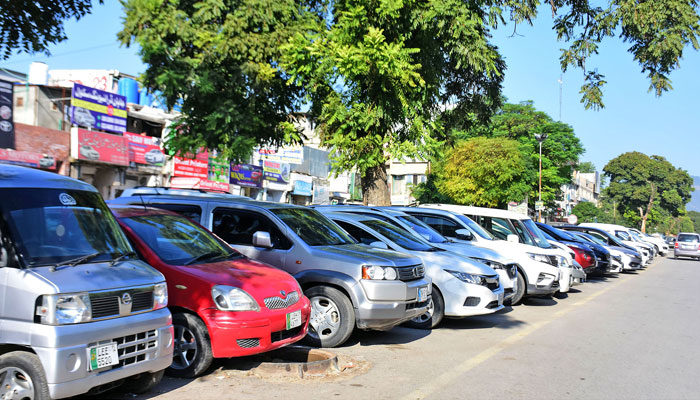Bumpy road
LAHORE: The auto car sector is undergoing a challenging period. All car assemblers have been compelled to shut down their plants for approximately 15 days each month. Consequently, car sales have plummeted, affecting the survival of auto vendors.
The car assemblers are not giving up. They realize that sales have declined due to the depressed economy, higher costs due to the devaluation of the dollar, and a shift in consumer preferences towards high-tech cars. Contrary to the first 15 years of this century when the small car segment dominated the market, the production and sales of cars above 1300cc now dominate sales. The small car segment got a boost when Suzuki launched its high-tech Alto version in the market.
Meanwhile, used car imports have outnumbered the production of some local assemblers. The local automobile industry produced only 26,988 cars during July-October. This is less than half the average four-monthly car production in normal years. Last fiscal year was one of the worst years for carmakers, with only 48,573 units being produced.
Statistics from the Pakistan Automobile Manufacturers Association (PAMA) reveal that production of Honda Civic peaked in 2017-18 at over 42,000 units, but declined to 12,800 units last fiscal year. In the first four months of this fiscal year, production has been negligible.
Production of Toyota Corolla and Yaris peaked in 2015-16 at over 57,400 units, but declined to 1,965 units in the first five months of this fiscal year. Suzuki Alto and Bolan are performing comparatively well, with cumulative production of 71,000 units, but this is still much below Suzuki's average.
The total number of cars produced in 2017-18 was 219,000, but this declined to 101,984 in 2022-23. During July-October, production was only 26,988 units.
Contrary to the decline in sales of locally assembled cars, the sales of imported used cars have increased substantially. In the first four months of this fiscal year, 10,575 used cars were imported. In the fiscal year 2022-23, only 6,050 used cars were imported. Used cars accounted for 28% of the total market in the first four months of this fiscal year. However, in October 2023, used cars claimed 50 percent of the total market share.
The surge in used-car imports contradicts the notion that sales are down due to economic distress. These cars are not even eligible for bank financing, and almost all cars, regardless of the segment, are sold at higher prices than similar locally assembled new variants. However, used car imports are dominated by the luxury car segment, particularly SUVs. Unfortunately, Pakistan does not produce a hybrid or SUV car.
Local assemblers have realized that they need to come up with luxury versions that compete with used car luxury cars. There are many plans in the pipeline, but Toyota has taken a lead in this regard by starting assembly of the Toyota Corolla Cross Hybrid SUV. It has invested $100 million in acquiring hybrid technology and producing some of its critical parts in Pakistan.
It has provided Rs160 million to a Lahore-based vendor to produce critical engine parts for its SUV. It has additionally provided Rs6.21 billion to its other vendors.
The introduction of new technology would be a game-changer in Pakistan's auto sector, and many existing assemblers are expected to follow suit. In fact, it was Kia that introduced a popular SUV, the Kia Sportage, but this was limited to importing completely built-up units (CBUs) that it was allowed to import under the new entrants policy. It has not assembled a single SUV with a local component.
-
 Inside Dylan Efron's First 'awful' Date With Girlfriend Courtney King
Inside Dylan Efron's First 'awful' Date With Girlfriend Courtney King -
 'Sugar' Season 2: Colin Farrell Explains What Lies Ahead After THAT Plot Twist
'Sugar' Season 2: Colin Farrell Explains What Lies Ahead After THAT Plot Twist -
 ‘Revolting’ Sarah Ferguson Crosses One Line That’s Sealed Her Fate As Well As Andrew Mountbatten-Windsor’s
‘Revolting’ Sarah Ferguson Crosses One Line That’s Sealed Her Fate As Well As Andrew Mountbatten-Windsor’s -
 AI Rivalry Heats Up As Anthropic Targets OpenAI In Super Bowl Ad
AI Rivalry Heats Up As Anthropic Targets OpenAI In Super Bowl Ad -
 Kate Middleton, Prince William Share Message Ahead Of Major Clash
Kate Middleton, Prince William Share Message Ahead Of Major Clash -
 Is Dark Matter Real? New Theory Proposes It Could Be Gravity Behaving Strangely
Is Dark Matter Real? New Theory Proposes It Could Be Gravity Behaving Strangely -
 Viral AI Caricature Trend: Is Your Personal Data Really Safe?
Viral AI Caricature Trend: Is Your Personal Data Really Safe? -
 Lil Jon’s Late Son, Nathan Smith Spoke Highly Of His Father Before His Tragic Death
Lil Jon’s Late Son, Nathan Smith Spoke Highly Of His Father Before His Tragic Death -
 China Boosts Reusable Spacecraft Capabilities By Launching For The Fourth Time
China Boosts Reusable Spacecraft Capabilities By Launching For The Fourth Time -
 Bianca Censori On Achieving 'visibility Without Speech': 'I Don't Want To Brag'
Bianca Censori On Achieving 'visibility Without Speech': 'I Don't Want To Brag' -
 'Concerned' Prince Harry Future Plans For Lilibet, Archie Exposed
'Concerned' Prince Harry Future Plans For Lilibet, Archie Exposed -
 Skipping Breakfast? Here Are Some Reasons Why You Shouldn't
Skipping Breakfast? Here Are Some Reasons Why You Shouldn't -
 Billie Eilish Slammed For Making Political Speech At Grammys
Billie Eilish Slammed For Making Political Speech At Grammys -
 Beverley Callard Announces Her Cancer Diagnosis: 'Quite Nervous'
Beverley Callard Announces Her Cancer Diagnosis: 'Quite Nervous' -
 WhatsApp May Add Instagram Style Close Friends For Status Updates
WhatsApp May Add Instagram Style Close Friends For Status Updates -
 Winter Olympics Officially Open In Milan, Cortina With Historic Dual Cauldron Lighting
Winter Olympics Officially Open In Milan, Cortina With Historic Dual Cauldron Lighting




